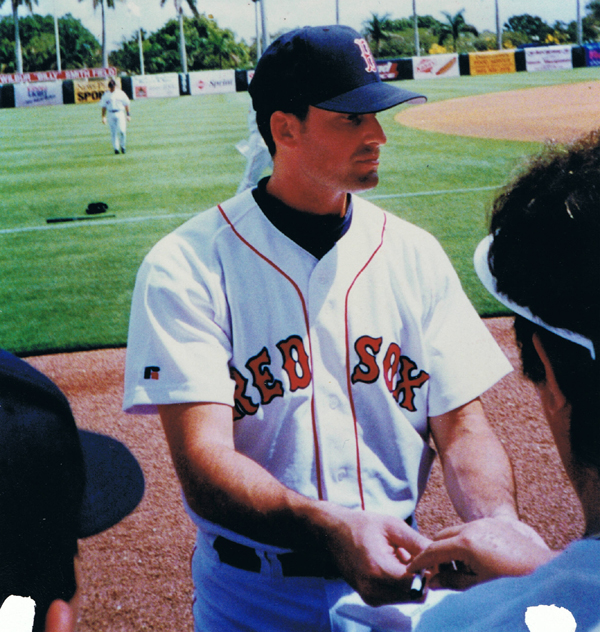Running the bases
 I guess to everyone besides my husband, Charley, and me it seemed almost a miracle that our two Ivy League sons signed contracts with the Boston Red Sox within ten days of each other in June, 1992. To us at the time, it was a natural extension of their abilities, an attainment of the next level they'd worked so hard to achieve. We had never looked beyond the next level.
I guess to everyone besides my husband, Charley, and me it seemed almost a miracle that our two Ivy League sons signed contracts with the Boston Red Sox within ten days of each other in June, 1992. To us at the time, it was a natural extension of their abilities, an attainment of the next level they'd worked so hard to achieve. We had never looked beyond the next level.
It began at the beach. Charley would play "rundown" with the boys between two bases in the sand. Often, many aspiring youngsters took turns as base runners. Charley was always one of the fielders positioned on a base, until finally he would give up from exhaustion. Then it moved to our backyard with neighborhood kids. Charley pitched to one and all after work.
Through all my sons' years in organized baseball, Charley coached and then advised, while I drove, cheered, organized raffles, and ran bake sales and car washes. Leagues melted into each other (four seasons a year when ice hockey was included). All of their school vacations during February, March, or early April were spent travelling to inaccessible, tundra-like places (the Upper Peninsula of Michigan) or chilly baseball sites (West Hartford, Conn).
A way of life
It was a shared family effort - everyone involved every step of the way. Why? Because Charley and I believed that team settings develop leadership qualities, the ability to set common goals, handle praise and criticism, and winning and losing. We drove all over New England, investing our time in what we considered to be important aspects of our sons' lives.
We missed "normal" activities like weddings; our social life centered around team parents. The laundry piled up, the grass grew long, and late-night homework made rising early a challenge. But our commitment became a way of life, habitual, accepted, and exciting. The boys knew we were their support group. We praised them when they achieved. By age thirteen, they had to have summer jobs - washing pots and pans in a restaurant or weeding in a nursery. We allowed no sense of entitlement.
Grades mattered, too
Nor did we let up on our academic expectations. Tim and Todd had to put as much time into developing their writing, math, or science skills as their skating or fielding. They knew there would be consequences if their grades dropped: the extracurricular activities would go.
We encouraged them simply because they loved to play. Once they committed, quitting wasn't tolerated. Those early, frantic years laid the foundation for the subconscious dream of professional sports. As a family, we had already worked together to make difficult things happen - state championships, All-Star and All-Ivy status.
The final result? We remained constant cheerleaders through their seven-year odyssey as minor leaguers with the Red Sox. When their journeys ended, our sons knew they had followed their dream to its final conclusion.
Pamela Carey is a former teacher and interior designer and the author of the recently published book, Minor League Mom: A Mother's Journey Through The Red Sox Farm Teams, about her experiences as the mother of former Ivy Leaguers who spent seven years in the Boston Red Sox minor league system. She lives with her husband, Charley, in Westport, Massachusetts and Delray Beach, Florida.









